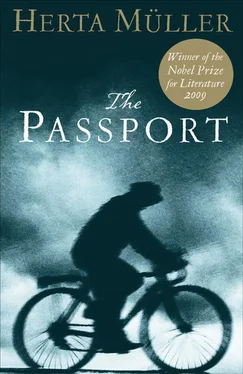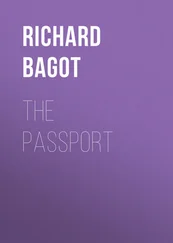Windisch walks through the grass and looks at the moon. “I’m telling you, Windisch,” calls the night watchman, “women deceive.”
The light is still burning in the joiner’s house. Windisch stops. The window pane shines. It reflects the street. It reflects the trees. The picture passes through the lace curtain. Through its falling posies of flowers into the room. A coffin lid leans against the wall beside the tiled stove. It’s waiting for the death of Widow Kroner. Her name is written on the lid. The room seems empty despite the furniture, because it’s so bright.
The joiner is sitting on a chair with his back to the table. His wife is standing in front of him. She is wearing a striped nightshirt. She’s holding a needle in her hand. A grey thread hangs from the needle. The joiner is holding out his forefinger to his wife. The woman is picking a splinter of wood out of his flesh with the point of the needle. The forefinger bleeds. The joiner pulls his finger back. The woman lets the needle fall. She lowers her eyes and laughs. The joiner grasps under her nightshirt with his hand. The nightshirt rides up. The stripes wriggle. The joiner grasps at his wife’s breasts with his bleeding finger. Her breasts are large. They tremble. The grey thread hangs on the chair leg. The needle swings, its point facing downwards.
The bed is beside the coffin lid. The pillow is made of damask. Spots are scattered across it, large ones and small ones. The sheet is white and the bedspread is white.
The owl flies past the window. One beat of its wings carries it across the pane. It twitches in flight. The light falls at an angle, and the owl becomes two.
Bent over, the woman walks up and down in front of the table. The joiner grabs her between the legs. The woman sees the needle hanging. She reaches for it. The thread sways. The woman lets her hand slide down her body. She closes her eyes. She opens her mouth. The joiner pulls her into bed by the wrist. He throws his trousers onto the chair. His underpants are stuffed into the trouser legs like a white rag. The woman opens her thighs and bends her knees. Her stomach is made of dough. Her legs are a white window frame on the sheet.
A picture in a black frame hangs over the bed. The headscarf of the joiner’s mother lies against the rim of her husband’s hat. The glass has a spot. The spot is on her chin. She smiles out of the picture. Close to death, she smiles. In less than a year. She smiles through the wall into the room.
The wheel of the well is turning, because the moon is large and is drinking the water. Because the wind is in its spokes. The sack is damp. It hangs over the rear wheel like a sleeping man. “The sack hangs behind me like a dead man,” thinks Windisch.
Windisch feels his stiff, obstinate member against his thigh.
“The joiner’s mother,” thinks Windisch, “has cooled down.”
In the heat of August, the joiner’s mother had lowered a big melon into the well in a pail. The well made waves around the pail. Water gurgled around the green skin. The water cooled the melon.
The joiner’s mother had gone into the garden with the big knife. The garden path was a furrow. The lettuce had shot up. Their leaves were stuck together by the white milk that forms in the stems. The joiner’s mother had carried the knife down the furrow. Where the fence begins and the garden ends, a white dahlia bloomed. The dahlia reached up to her shoulder. The joiner’s mother smelt the dahlia. She smelt at the white leaves for a long time. She breathed in the dahlia. She rubbed her forehead and looked into the yard.
The joiner’s mother cut the white dahlia with the big knife.
“The melon was just a pretext,” said the joiner after the funeral. “The dahlia was her misfortune.” And the joiner’s neighbour said, “The dahlia was a vision.”
“Because it was so dry that summer,” said the joiner’s wife, “all the dahlia’s leaves were white and closed up. Its flower was larger than any dahlia can be. And because there was no wind that summer, it didn’t drop off. The dahlia had long breathed its last, yet it couldn’t wither.”
“You can’t stand it,” said the joiner, “no one can stand it.”
No one knows what the joiner’s mother did with the dahlia she had cut off. She didn’t bring the dahlia into the house. She didn’t put it in the room. She didn’t leave it lying in the garden either.
“She came out of the garden. She had the big knife in her hand,” said the joiner. “There was something of the dahlia in her eyes. The whites of her eyes were dry.”
“It may be,” said the joiner, “that she was waiting for the melon and plucked the dahlia to pieces. Plucked it apart with her hands. Not a single petal lay scattered on the ground. As though the garden were a room.”
“I believe,” said the joiner, “that she scraped a hole in the ground with the big knife. She buried the dahlia.”
The joiner’s mother had pulled the pail out of the well late in the afternoon. She carried the melon to the kitchen table. She stabbed into its green skin with the point of the knife. She turned her arm and the big knife in a circle and cut the melon through the middle. The melon cracked. It was a death rattle. In the well, on the kitchen table, until its two halves were split apart, the melon had still been alive.
The joiner’s mother had opened her eyes wide. Because her eyes were as dry as the dahlia, they did not grow large. The juice dripped from the blade of the knife. Her eyes were small and full of hate as she looked at the red flesh. The black seeds lay above one another like the teeth of a comb.
The joiner’s mother had not cut the melon into slices. She placed the two halves in front of her. She dug the red flesh out with the point of the knife. “She had the greediest eyes I’ve ever seen,” said the joiner.
The red water had dripped over the kitchen table. Dripped from the corners of her mouth. Dripped down from her elbows. The floor was sticky from the red water of the melon.
“My mother’s teeth had never been so white and cold,” said the joiner. “She ate and said: Don’t look at me like that, don’t look at my mouth. She was spitting the black seeds onto the table.”
“I looked away. I didn’t leave the kitchen. I was frightened of the melon,” said the joiner. “I looked out of the window into the street. Someone I didn’t know was walking past. He was walking quickly and talking to himself. I heard my mother digging with the knife. Heard her chewing. And swallowing. Mother, I said without looking at her, stop eating.”
The joiner’s mother had raised her hand. “She screamed, and I looked at her, because she’d screamed so loudly,” said the joiner. “She threatened me with the knife. ‘This is no summer, and you’re no man,’ she screamed. ‘My temples are throbbing. My bowels are burning. This summer is throwing out the fire of many years. Only the melon cools me down.’”
The pebbles are uneven and small. The owl cries behind the trees. It’s looking for a roof. The houses stand white and streaked with lime.
Windisch feels the obstinate member below his navel. The wind knocks on the wood. It’s sewing. The wind is sewing a sack in the earth.
Windisch hears his wife’s voice. She says: “Monster.” Every night when Windisch turns his breath towards her in bed, she says: “Monster.” For two years she has had no uterus in her stomach. “The doctor told me not to,” she says, “I’m not going to let my insides be messed about just to please you.”
When she says it, Windisch feels a cold anger between her face and his. She grasps Windisch by the shoulder. Sometimes it takes a while before she finds his shoulder. When she has found Windisch’s shoulder she says in the darkness close to Windisch’s ear, “You could be a grandfather by now. Our time has past.”
Читать дальше












